 |
BRICS: A Very Short IntroductionOxford, (2016) Description
REVIEW OF THE BOOK BY OLIVER STUENKEL ON GOVERNANCE : Stuenkel-2018-Governance
|
 |
Diplomatic AfterlivesPolity, (2014) DescriptionNo longer content to fade away into comfortable retirement, a growing number of former political leaders have pursued diplomatic afterlives. From Nelson Mandela to Jimmy Carter, and Bill Clinton, to Tony Blair and Mikhail Gorbachev, this set of highly-empowered individuals increasingly try to make a difference on the global stage by capitalizing on their freelance celebrity status while at the same time building on their embedded club attributes and connections. In this fascinating book, Andrew F. Cooper provides the first in-depth study of the motivations, methods, and contributions made by these former leaders as they take on new responsibilities beyond service to their national states. While this growing trend may be open to accusations of mixing public goods with private material gain, or personal quests to rehabilitate political image, it must he argues be taken seriously as a compelling indication of the political climate, in which powerful individuals can operate outside of established state structures. As Cooper ably shows, there are benefits to be reaped from this new normative entrepreneurism, but its range and impact nonetheless raise legitimate concerns about the privileging of unaccountable authority. Mixing big picture context and illustrative snapshots, Diplomatic Afterlives offers an illuminating analysis of the influence and the pitfalls of this highly visible but under-scrutinized phenomenon in world politics. Table of Contents1. Hyper-Empowered Individuals on the Global Stage |
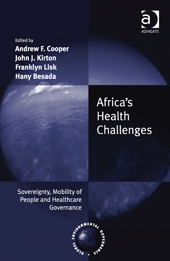 |
Africa’s Health Challenges: Sovereignty, Mobility of People and Healthcare GovernanceAshgate, (2013) DescriptionAndrew Cooper is the co-editor of Africa’s Health Challenges: Sovereignty, Mobility of People and Healthcare Governance (Ashgate: 2013). “This volume addresses the ideational and policy-oriented challenges of Africa’s health governance due to voluntary and involuntary cross-border migration of people and diseases in a growing ‘mobile Africa’. The collected set of specialized contributions in this volume examines how national and regional policy innovation can address the competing conception of sovereignty in dealing with Africa’s emerging healthcare problems in a fast-paced, interconnect world.” |
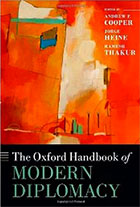 |
The Oxford Handbook of Modern Diplomacy (Oxford Handbooks in Politics & International Relations)(Oxford University Press, USA (2013), 904. DescriptionAt a time when diplomatic practices and the demands imposed on diplomats are changing quite radically, and many foreign ministries feel they are being left behind, there is a need to understand the various forces that are affecting the profession. Diplomacy remains a salient activity in today’s world in which the basic authoritative actor is still the state. At the same time, in some respects the practice of diplomacy is undergoing significant, even radical, changes to the context, tools, actors and domain of the trade. These changes spring from the changing nature of the state, the changing nature of the world order, and the interplay between them. One way of describing this is to say that we are seeing increased interaction between two forms of diplomacy, “club diplomacy” and “network diplomacy”. The former is based on a small number of players, a highly hierarchical structure, based largely on written communication and on low transparency; the latter is based on a much larger number of players (particularly of civil society), a flatter structure, a more significant oral component, and greater transparency. The Oxford Handbook of Modern Diplomacy is an authoritative reference tool for those studying and practicing modern diplomacy. It provides an up-to-date compendium of the latest developments in the field. Written by practitioners and scholars, the Handbook describes the elements of constancy and continuity and the changes that are affecting diplomacy. The Handbook goes further and gives insight to where the profession is headed in the future. Co-edited by three distinguished academics and former practitioners, the Handbook provides comprehensive analysis and description of the state of diplomacy in the 21st Century and is an essential resource for diplomats, practitioners and academics. |
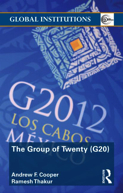 |
The Group of Twenty (G20)(New York: Routledge, 2012) (Foreword by the Rt. Hon Paul Martin, former Prime Minister of Canada), 184. |
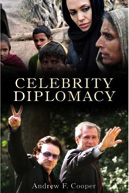 |
Celebrity Diplomacy(Boulder, CO: Paradigm Publishing, 2007), 150. ReviewsCooper’s analysis gives convincing depth to a phenomenon commonly and unfairly derided as superficial posturing, and confirms the rising power of non-state actors in a globalized world. …Celebrity Diplomacy poses great questions, features characters who are larger than life, and builds a powerful intellectual case that the insular world of diplomacy has been irredeemably transformed by celebrity culture. –Mark Fried in Literary Review of Canada A new type of transnational activist has emerged, both co-operating and competing with established diplomatic practitioners. Movie stars, musicians, and CEOs have grabbed new roles on the world stage, simultaneously levering their access to world leaders and mass audiences. The global system is increasingly open to and challenged by their participation in a manner that very few would have anticipated. Blending an appreciation of both complex forms of diplomacy and the exciting but unpredictable dynamics of popular culture, Andrew F. Cooper brings focus to this significant, yet under-analyzed, area of international relations. –Jorge Heine, Ambassador of Chile to India and Vice President of the International Political Science Association. |
 |
Internet Gambling Offshore: Caribbean Struggles over Casino Capitalism(London: Palgrave Macmillan, 2011), 201. (Shortlisted for the 2011 Gordon K. & Sybil Lewis Award from the Caribbean Studies Association. Reviews‘Cooper’s study of the global Internet gambling industry captures like in a holographic image the complexities and nuance of contemporary international politics where morality, regulatory and material interests clash and intersect. It is a superb study that questions our conventional notions of power, interest or outcomes in a globalized political economy.’ – Ronen Palan, Professor of International Political Economy, University of Birmingham, UK ‘As Andrew Cooper shows in this absolutely fascinating book, “casino capitalism” is not just a metaphor for a wheeling-and-dealing global financial system but a massive commercial sector – partly operating in cyberspace – that has been entirely glossed over by International Political Economy scholars. Internet gambling, as Cooper persuasively demonstrates, is not just an extremely interesting case study in its own right but a cutting edge illustration of the international politics of regulating the “offshore world”.’ – Peter Andreas, Professor of Political Science and International Studies, Brown University, USA ‘Cooper’s analysis provides a gripping story with many lessons for students of International Political Economy, lessons that Susan Strange herself would have appreciated.’ – from the Foreword by Eric Helleiner, CIGI Chair and Professor of International Political Economy, University of Waterloo, Canada ‘Andrew Cooper has produced the first book to focus on the important case of internet gambling and it will probably be the definitive account. It will be of interest to many non-specialists.’ – Literary Review of Canada “I would highly recommend this accessible and interesting book to students, academics, policy-makers and those with a general interest in international politics/political economy.” – Commonwealth & Comparative Politics |
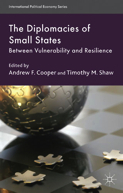 |
The Diplomacies of Small States: Between Vulnerability and Resilience(London: Palgrave Macmillan, 2009), 272 (paperback version, forthcoming January 2013) Reviews‘There’s now a substantial, and ever-growing, literature on small states, and yet most of this takes the form of academic articles and commentaries rather than dedicated stand-alone volumes that interrogate the key issues and themes pertinent to small states. This volume does an absolutely outstanding job in identifying, and exploring, this diversity of issues and themes in an accessible and engaging manner. It sets out brilliantly the core debates surrounding the status of small states in the international political economy – including, crucially, as actors in rather than passive objects of international relations – and, as such, offers a good way in to debates about development more broadly. It’s a fabulous book that, crucially, speaks both to academic scholars and students alike.’ – Nicola Smith, Senior Lecturer in Political Science, University of Birmingham, UK |
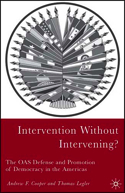 |
Intervention Without Intervening? OAS and Democracy in the Americas(New York: Palgrave Macmillan, 2006), 192. Reviews“This volume is an important contribution to the discussion of multilateralism and the defense of democracy. Focusing on the OAS, the authors provide a clear explanation of the complexities of multilateral action in defense of democracy, a candid evaluation of the constraints on the OAS, and a hopeful appraisal of the new multilateralism in support of democracy in the hemisphere. This is a book that all students of hemispheric affairs will want to read.”– Joseph Tulchin, Woodrow Wilson International Center for Scholar “Cooper and Legler have written a very important and impressive book, at the intersection of democracy and multilateralism in the Americas. Their argument about the role the OAS has played in Peru and Venezuela is highly persuasive, and buttressed by detailed, scrupulous research and a solid conceptual framework. This timely book offers invaluable policy guidance, and should be read by both practitioners and scholars. It is commendably level-headed, yet inspired by a deep concern for collectively defending and promoting democracy in the Americas.” –Michael Shifter, Vice President for Policy, Inter-American Dialogue and Adjunct Professor, Georgetown University “Tom Legler and Andrew Cooper have written a penetrating and authoritative book about the promotion and defense of democracy in the Americas. “Intervention without Intervening” should be read by everyone interested in international aspects of democratization. It appraises a model of collective support for democracy based on multilateralism and soft power, not unilateralism and military intervention. This is a timely and readable account of how the international community can better support new democracies in Latin America.” — Maxwell A. Cameron, Department of Political Science, the University of British Columbia “This an important study of regional evolution and integration.” — A. Siaroff, University of Lethbridge, Choice Magazine |
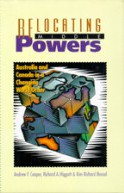 |
Relocating Middle Powers(Boulder, CO: Paradigm Publishing, 2007), 150. ReviewsThis comparative study of the foreign policy of two middle powers is clearly ground-breaking in nature, and one hopes it will direct more attention to international relations theorists to lesser powers in a post-hegemonic, post-cold war era. – Theodore H. Cohn, Simon Fraser University This well organized and clearly written book succeeds in establishing that a focus on the intellectual and entrepreneurial leadership of middle powers yields a significant gain in explanatory power when used to complement more orthodox approaches to the collective action problems inherent to forging cooperative international institutions. For those seeking an antidote to the great power chauvinism and often parochial character of much American scholarship on questions of leadership, hegemony, cooperation and world order, Relocating Middle Powers provides an informative and provocative alternative. – David P. Rapkin, American Political Science Review A welcome addition to the literature on the comparative study of Canadian and Australian foreign policy, this book also serves as a timely counter to the wave of literature exploring the “new world order” role of the United States; it reminds us that other players are present and can shape events. – Lawrence T. Woods, Canadian Book Review Annual |
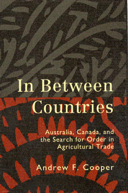 |
In between Countries(Boulder, CO: Paradigm Publishing, 2007), 150. Reviews“In Between Countries makes an original contribution in the field of international political economy, advancing our understanding of how middle powers behave. By highlighting some of the distinctive features of Canadian and Australian foreign policies it furthers the understanding of both.” Derek McDougall, Department of Political Science, University of Melbourne, Australia “In Between Countries is a valuable discussion of policy issues on agriculture and international trade more generally. Cooper makes good use of the middle power concept, including the related notion of followership, acknowledging the limitations of the concept as well as stressing its utility. This kind of comparative analysis is a productive way of exploring the distinctive characteristics of Canada’s foreign economic policies.” Robert Boardman, Department of Political Science, Dalhousie University |
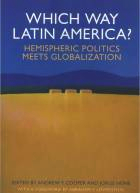 |
Which Way Latin America?(Boulder, CO: Paradigm Publishing, 2007), 150. ReviewsReview “Which Way Latin America? offers a fresh perspective on an old question that has yielded, up to now, tired answers. The authors survey the new landscape of more inclusive democracies and more independent foreign policies. The Obama Administration ought to read this to chart a new approach to the region.” —Robert Pastor, Professor of International Relations, American University, and former US National Security Advisor for Latin America (1977-1981) “This is an ambitious and important volume. It brings together a group of the hemisphere’s best analysts and thinkers to explain how profoundly Latin America has changed in recent years, and what those changes mean for the people and politics of the region and for its relations with the US and the rest of the world.” —Peter Hakim, President of Inter-American Dialogue “This excellent collection focuses on the dynamic interaction between Latin American and a fast-changing global system. Chapters expertly analyze crucial dimensions of this interaction, including democracy and the ‘rise of the left’, energy competition and resource nationalism, relations with China and India, the fraying of the Inter-American System, and such pivotal cases as Venezuela, Mexico, and Brazil. Contributors unpack both the impact of the world in and on the region, and the ever more complex and diversified relationship between the region and the world.” —Andrew Hurrell, Montague Burton Professor of International Relations, Balliol College, Oxford University |
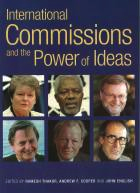 |
International Commissions and the Power of Ideas(Boulder, CO: Paradigm Publishing, 2007), 150. Reviews“This is the first volume that really focuses on the nature and impacts of the international commissions. . . . This book is a very valuable volume for government and international organization officials as well as academic scholars.” —Mark W. Zacher, Centre of International Relations, University of British Columbia Liu Institute “[The book] brings new insights into new concepts and ideas as products of changing times and their impact as agencies of change. It therefore makes a useful contribution to the study of global governance in key issue areas.” —Tatsuro Kunugi, International Christian University, Tokyo, and former UN assistant secretary general |
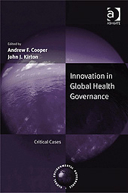 |
Innovation in Global Health Governance(Boulder, CO: Paradigm Publishing, 2007), 150. Reviews‘No-one involved in global governance can afford to miss this analysis. It illustrates the innovative capacity that has driven the governance of health in the face of global vulnerability and crisis. The well documented case studies make this change tangible and open up the potential for better collective action. May the decisionmakers of the G20 read this book as they pick up the pieces after the financial crisis and work to reform the global system.’ Ilona Kickbusch, The Graduate Institute Geneva, Switzerland ‘Global health governance has become one of the most critical and exciting areas in public health, and is having profound effects on health policy. However, many non-specialists have been deterred by the difficulty of finding the best literature in this rapidly evolving field and putting it into context, while many specialists may not be fully aware of new innovations. This admirable volume makes the field accessible through real world examples presented by leading experts, and highlights some possibilities for new strategies. This book will be an indispensable resource for both the non-specialist who wants to gain a better current understanding of the field, and for experienced researchers who want to broaden their horizons.’ Stephen S. Morse, Columbia University and Mailman School of Public Health, USA ‘This is a clear and prescient analysis of contemporary global health governance – its innovations, strengths, challenges and pitfalls. It is a must read for academics, government officials and activists alike.’ James Orbinski, University of Toronto, Canada and former international President of Médecins Sans Frontières/ Doctors Without Borders ‘In Innovation in Global Health Governance, the editors propose a theoretical framework to explain and assess recent innovations in national and international governance related to global health…a useful survey of recent global health governance developments and issues.’ Clinical Infectious Diseases |
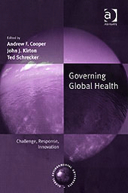 |
Governing Global Health(Boulder, CO: Paradigm Publishing, 2007), 150. Reviews‘This is a seminal work. We live in an interconnected world in which health and illness, like so much else, have gone global. This challenge will demand major changes in transnational governance. The book discusses in a detailed and imaginative way what these changes should be.’ Lord Anthony Giddens, London School of Economics and Political Science, UK ‘At a time when the human species faces great uncertainty over its capacity to balance globalization with the need for social and environmental protection, this book makes an important contribution to our understanding of global health governance. As well as revealing the limitations of existing institutions, the authors encourage innovative thinking about how to better address the challenges of global health.’ Kelley Lee, London School of Hygiene and Tropical Medicine, UK ‘This book will interest professionals working on health policy…Recommended. Graduate students, faculty/researchers, and professionals/practitioners.’ Choice ‘This excellent book provides a comprehensive and analytical overview of the socio-political and economic factors that contribute to an understanding of global health governance. The opening chapter outlines compelling arguments for why such an understanding should be everyone’s business…This is a visionary and challenging text that should be required reading for all healthcare professionals and their teachers.’ Nursing Standard ‘Overall, this book makes the case for why global health governance must be further explored within international relations. There have recently been important developments in international law and the role of international organizations, and this book makes a good start in taking this exploration further.’ Political Studies Review ‘This book gives the reader an excellent perspective on the war against the spread of disease as well as some unvarnished and high-resolution views of the terrain and the challenge before us that must be met and vanquished.’ New England Journal of Medicine ‘The contributors of the 14 chapters which comprise the volume are knowledgeable, prominent scholars of global health…This book is a must-read for anyone interested in global health governance; it is an excellent, coherent contribution to the current debates on this topic of major consequence for human security and welfare.’ The Round Table ‘This book may allow health professionals on an international level to understand better the power games with which their actions are linked. It is also a tool for researchers and students working in governance in general or in global cooperation within the field of health.’ Etudes internationales ‘…the collection as a whole provides excellent material for a discourse analysis of conversations regarding global governance and health…[it] is quite fascinating as a reflection of several contending ways of answering the general question of why health in developing countries might matter.’ Health Sociology Review ‘…the text provides a solid overview of core 21st century health challenges, and delves into very specific health governance issues such as securitization, the contextual frame of human rights discourse, and health performance outcomes in case regions like Africa. In this regard, it would be a useful text for public health and policy scholars, as well as a source for issue area readings in an advanced undergraduate or graduate seminar.’ Critical Public Health |
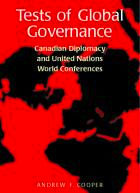 |
Tests of Global Governance: Canadian Diplomacy and United Nations World Conferences(Tokyo: United Nations University Press, 2004), 400. |
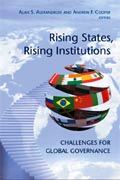 |
Co-editor, Rising States, Rising Institutions: Challenges for Global Governance(Washington, D.C.: Brookings Institution Press, 2010), 318. |
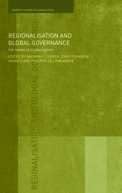 |
Regionalisation and Global Governance: The Taming of Globalisation?(London: Routledge, 2007), 272. |
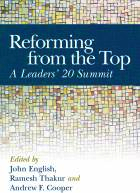 |
Reforming from the Top: A Leaders’ 20 Summit(Tokyo: United Nations University Press, 2005), 380. |
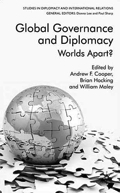 |
Global Governance and Diplomacy: Worlds Apart?(London: Palgrave Macmillan, 2008), 320. |
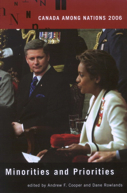 |
Minorities and Priorities: Canada Among Nations 2006(Montreal/Kingston: McGill-Queen’s University Press, 2006), 367. |
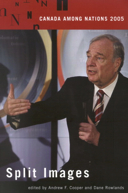 |
Split Images: Canada Among Nations 2005(Montreal/Kingston: McGill-Queen’s University Press, 2005), 295. |
